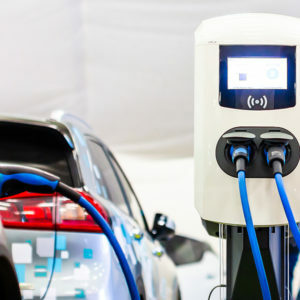President Joe Biden came to New Hampshire Tuesday to hit the “local money” message hard: The infrastructure bill means big bucks for Granite State projects.
“Folks, it’s not hyperbole to say your delegation is laser-focused on your needs — the people of New Hampshire,” Biden said Tuesday at the bridge in Woodstock. “The concerns that are discussed around your kitchen tables. This isn’t esoteric. It’s about what happens to ordinary people.”
Ordinary people who drive electric vehicles.
According to a White House press handout for Biden’s trip to Woodstock, N.H., “Under the Infrastructure Investment and Jobs Act, New Hampshire would expect to receive $17 million over five years to support the expansion of an EV charging network in the state. New Hampshire will also have the opportunity to apply for the $2.5 billion in grant funding dedicated to EV charging in the bill.”
It’s part of the “$7.5 billion to build out the first-ever national network of EV chargers in the United States.”
Spending $17 million on EV charging stations in New Hampshire is an interesting investment of tax money given that, statistically speaking, there aren’t any EVs in New Hampshire. According to vehicle registration data, as of the end of 2020, there were just 2,690 EVs in the entire state.
Taxpayers will be spending $6,319.70 per EV in the Granite State. If the state somehow gets that $2.5 billion in grant funding, it would be more than $833,000 per electric car.
And that’s on top of the general tax subsidies people who buy EVs already get. The federal electric vehicle tax credit program gives up to $7,500 in taxpayer dollars for qualifying purchases. Households earning more than $100,000 collect about 80 percent of those EV kickbacks.
Not that there are a lot of EVs nationwide, either.
Of the more than 276 million vehicles registered in the United States, fewer than 1.5 million are plug-in electric vehicles and another 5.4 million are hybrid electric. That’s less than 2 percent of the registered vehicles on the road, and nearly half of all electric vehicles in the country are in California alone.
In fact, in 2017 more EVs were sold in California than all other states combined.
The EV money is also another example of New Hampshire getting less funding from the infrastructure bill than its neighbors in Vermont. Despite having less than half the Granite State’s population, Vermont will receive $21 million for its EV charging network, or $9,417 per electric vehicle.
All four members of the New Hampshire delegation voted for the $7.5 billion as part of the bipartisan infrastructure bill. Rep. Annie Kuster has pushed to get even more EV charging money in the social programs/green energy reconciliation budget bill.
“Folks, when you see these projects starting in your hometown, I want you to feel what I feel: Pride,” Biden said as he stood on the Green Bridge in Woodstock.
It’s unlikely more than a handful of EVs have ever driven across that span.




